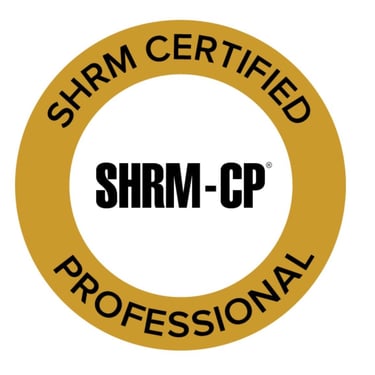Experience. Integrity. Results.
The Benefits of Hiring a Fractional Chief Human Resource Officer
2/2/20254 min read


Understanding the Role of a Fractional Chief Human Resource Officer
A fractional Chief Human Resource Officer (CHRO) is an executive-level professional who provides interim or part-time HR leadership to organizations. Unlike traditional full-time HR executives, who a single company typically employs on a permanent basis, fractional CHROs work with multiple organizations, often on a contract basis. This flexible arrangement allows businesses, particularly small to mid-sized companies, to benefit from the expertise of seasoned HR leaders without the financial commitment associated with a full-time hire.
Fractional CHROs bring a wealth of experience and knowledge, enabling organizations to navigate complex human resource challenges effectively. They can offer strategic guidance in talent acquisition, employee engagement, compliance, and compensation planning. By leveraging their extensive professional network and industry insights, fractional CHROs can implement best practices and innovative HR solutions tailored to an organization's specific needs.
This model is particularly advantageous for businesses without the budget or needing a full-time HR executive. Employing a fractional CHRO allows organizations to tap into high-level HR expertise as required, ensuring they receive strategic oversight and guidance while avoiding the costs of a full-time salary and benefits. Additionally, fractional CHROs can provide a fresh perspective, which may help companies identify and address HR issues they may have overlooked.
Furthermore, the demand for flexible and agile HR solutions is growing as the business landscape becomes increasingly complex. Companies often face challenges adapting to regulatory changes, managing remote teams, or navigating new initiatives. In these scenarios, a fractional CHRO can serve as an invaluable resource, offering customized strategies to foster a positive organizational culture and drive employee performance.
Cost Efficiency: A Smart Financial Move
In the contemporary business landscape, companies increasingly recognize the financial advantages of hiring a fractional Chief Human Resource Officer (CHRO). This innovative approach allows organizations to access top-tier HR expertise without the economic burden associated with a full-time executive. By opting for a fractional CHRO, businesses significantly reduce overhead costs, including salary expenditures and the comprehensive benefits packages that come with full-time employment.
Typically, the salary of a full-time CHRO can be substantial, encompassing not only the base pay but also bonuses, healthcare, retirement plans, and other perks. In contrast, employing a fractional CHRO enables organizations to leverage expert-level guidance at a fraction of the cost. As a fractional CHRO is considered a business expense, its fees are tax deductible at both the federal and state levels. This can allow businesses and non-profits to allocate their financial resources more strategically, channeling funds into core business growth areas or operational improvements.
Moreover, hiring a fractional CHRO can yield considerable savings by enhancing overall workforce productivity. These professionals bring extensive experience and insights, which can lead to improved employee engagement and performance. Efficient human resource strategies can help streamline recruitment processes, optimizing talent acquisition and retention. As a result, businesses benefit from reduced turnover costs, which are often significant when considering the expenses associated with onboarding new employees and lost productivity during transitions.
The financial implications of integrating a fractional CHRO into an organization are manifold. Not only do companies save on direct salary costs, but they also access invaluable HR strategies that promote workforce efficiency and stability. This dual advantage positions hiring a fractional CHRO as a prudent financial strategy for businesses aiming to enhance their HR capacity and economic resilience.
Strategic HR Leadership Without Long-Term Commitment
In today’s rapidly evolving business environment, organizations often face the challenge of adapting their human resource strategies to meet changing demands. Hiring a fractional Chief Human Resource Officer (CHRO) can offer substantial strategic benefits that allow businesses to navigate these complexities without the long-term commitment associated with a traditional HR leadership role. A fractional CHRO provides organizations access to seasoned HR expertise that can effectively lead initiatives and implement necessary changes.
One of the key advantages of enlisting a fractional CHRO is their ability to deliver customized HR strategies aligned with an organization’s specific goals and needs. Unlike typical hires who may be focused on broader HR management tasks, a fractional CHRO collaborates closely with company leadership to develop and execute targeted initiatives. This tailored approach ensures that HR strategies are well-aligned with business objectives and responsive to immediate challenges that may arise within the workforce.
Additionally, a fractional CHRO can take charge of vital projects, such as restructuring initiatives or implementing new employee engagement programs. These professionals bring a wealth of experience and insights from various industries, which allows them to propose innovative solutions that traditional HR counterparts may not consider. The agility provided by a fractional CHRO enables organizations to promptly adapt to market or workforce dynamics shifts, facilitating quicker decision-making and the seamless execution of HR practices.
Ultimately, the strategic integration of a fractional CHRO into an organization can lead to improved HR outcomes while maintaining the flexibility that many growing businesses require. By leveraging their expertise on a fractional basis, organizations can ensure they remain competitive and effectively manage their human capital, all without the obligations tied to a permanent executive appointment.
Enhancing Workplace Culture and Employee Engagement
In today’s dynamic corporate environment, a Chief Human Resource Officer (CHRO) is pivotal in shaping workplace culture and boosting employee engagement. Engaging a fractional CHRO can significantly enhance these aspects by leveraging their expertise to implement best practices in employee relations. One of the primary responsibilities of a fractional CHRO is to cultivate a culture that emphasizes open communication, trust, and collaboration among team members. By closely assessing the current workplace environment, a fractional CHRO can identify areas for improvement and introduce strategic initiatives tailored to the company’s unique needs.
Moreover, the impact of a fractional CHRO extends to employee engagement strategies that motivate and inspire the workforce. For instance, real-world examples demonstrate that CHROs implementing recognition programs and employee feedback systems significantly boost morale. By recognizing employee achievements and encouraging their voices in decision-making, fractional CHROs foster a sense of belonging and ownership among team members. This engagement translates into higher job satisfaction and retention rates, ultimately benefiting the organization.
In conclusion, the influence of a fractional CHRO on workplace culture and employee engagement is profound. Their expertise in employee relations, commitment to diversity and inclusion, and innovative engagement strategies can transform workplace environments, resulting in content and dedicated employees who feel valued and motivated.





